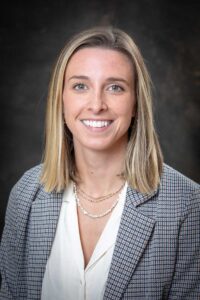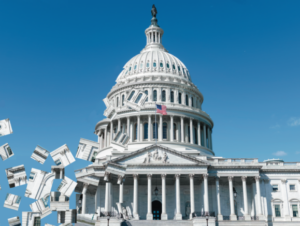Americans Are Distrusting Of The News Media Industry, But Have Confidence In Sources That Appeal To Their Political Viewpoints
NEWPORT, RI—Americans have become more distrusting of the news media industry over the last two decades, though they are willing to tune into news sources that confirm their political point of view, according to research compiled by the Pell Center at Salve Regina University.
As part of its new “Polarization Index,” authored by Associate Director Katie Langford Sonder, the Pell Center gathered data from numerous reputable sources to create a holistic understanding of polarization in America. Part IV, with a focus on news media and misinformation, shows Americans are increasingly concerned about bias in news coverage and believe mainstream media and social media companies play a major role in driving political division in the country. About half of Republicans, along with 80% of Democrats, believe conservative news media is also a major contributor (FiveThirtyEight, 2022).

Despite—or perhaps because of—a general mistrust of the news industry, Democrats and Republicans hold confidence in news sources which confirm their point of view and are biased towards their end of the political spectrum. There is little overlap beyond a shared trust of The Weather Channel. Democrats tune in to sources like CNN and MSNBC at much greater rates than Republicans, who trust Fox News above all (Sanders, YouGov, May 2023). With such partisan loyalties, the paradox of mistrusting the news but trusting certain sources becomes plausible and leads to heated debates over facts.
As trust has declined, the way Americans get their news has changed as well. Americans increasingly go online, including social media sites, to get most of their news. This transition online is spurred by the younger generation, which is most likely to go online for news and the most likely to trust the information they see there (Knight Foundation and Gallup, Jan. 2023; Liedke and Gottfried, Pew Research Center, Oct. 2022).
While most U.S. adults go online for news, the majority believe they see disinformation online daily. They agree that the increase of access to information makes it more difficult to stay informed and to parse what’s real from what’s fake (Associated Press and NORC Center, 2023; Knight Foundation and Gallup, Jan. 2023).
As a result, or at least in part because of this fatigue, some Americans have begun to avoid the news: nearly half of Americans sometimes or often actively avoid the news. Over a third of left and right leaning adults avoid national news politics, but liberals tend to avoid the news because it brings down their mood while conservatives avoid it because it is untrustworthy or biased (Newman, Reuters Institute, June 2022).

“I’ve noticed when people hear talk of polarization, often their first responses is something along the lines of: it’s the media who’s to blame for driving division. It’s the first root cause they call upon,” says Langford Sonder. “It’s healthy to be skeptical and to question the motives of for-profit industries. But this data also encourages us to take stock of our own reinforcing media bubbles.”
The research is presented in Part IV of the “Polarization Index: A Holistic Analysis of the State of U.S. Political Strife” which Sonder authored for the Pell Center at Salve Regina University. The four-part series uses national data to understand how politically polarized Americans are on the most pressing issues of the day. Parts I and II, which cover affective and ideological polarization, can be downloaded here. Part III, with original data analysis on bipartisanship in Congress, is available here.
Katie Langford Sonder is the Associate Director of the Pell Center at Salve Regina University and directs the Center’s research agenda, contributing her own scholarship while supporting the work of Pell Center fellows. She also directs the Nuala Pell Leadership Program at the Pell Center which exposes a select number of diverse, high-achieving undergraduate students at Salve Regina to both the theory and practice of leadership with an emphasis on public service. Langford Sonder joined the Pell Center in 2022.

